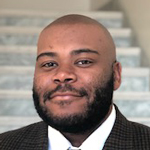Guy King
Guy King (MSJ17)
External communications manager at DRW
 Tell us about your career path. How did you get where you are today?
Tell us about your career path. How did you get where you are today?
Medill equipped me with a strong journalistic foundation and training I’ve found necessary in a career of public relations. During my time as a Medill MSJ student reporting for the Medill News Service, USA Today, and various Gannett affiliates, I found there are many formats of storytelling, including public relations. Since graduating, I’ve led communications efforts in both the public and private sectors by using unique approaches leveraging my Medill education and network to build various thought leadership and executive visibility campaigns on behalf of reputable officials and corporations
What are your main responsibilities in your current role?
Currently, I lead external communications for DRW and its many subsidiaries, working closely under the firm’s Chief Marketing and Communications Officer. I find ways to engage media outlets to position the firm and its many executive industry leaders in both media coverage and thought leadership moments. Also, I serve as a counselor to the firm’s leaders on external matters.
What is one of your proudest career accomplishments?
My proudest career accomplishments have been the opportunities I’ve been afforded to shine a light on the work the private sector is doing in regard to diversity and equity. I’ve worked with Citi’s CFO, Mark Mason, and the Washington Post’s Jonathan Capehart to discuss the bank’s commitment to closing the racial wealth gap for the Washington Post’s Race in America series. I led a media relations campaign to highlight the work the PepsiCo Foundation and the National Urban League has been doing to support Black-owned businesses through its Black Restaurant Accelerator Program. I’ve also been able to work with my Medill classmates–PBS Chicago’s Angel Idowu and Chicago Defender’s Tacuma Roeback–for a Chicago Tonight segment and Chicago Defender profile story on DRW’s apprenticeship program, which has offered people from underrepresented communities a technical skill set to pivot into the financial technology and technology industries.
What does Black History Month mean to you?
Being from Jackson, Mississippi, I grew up with Black history all around me. I’d hear stories from my great-grandmother and grandmother about their experience as Black women growing up in Mississippi. For me, I reflect on the resilient, strong people I come from all 365 days of the year and have been doing so since childhood. But, as an adult Black History Month presents a time for an even deeper introspective look into how my ancestors have influenced me who I am today and who I will be tomorrow. As I get older, I celebrate Black History Month by diving deeper into roots in the Deep South and my family’s perseverance to serve as a reminder there are no limits to where I can go.
How can your industry be more inclusive and representative of society?
The financial services industry has made positive strides toward inclusivity. We’re seeing more people of color, women and queer individuals take on leadership roles within traditional institutions and become founders of their own entities across the industry. As with many things, there is always more to do, and there are people working inside the industry to ensure equity and diversity is being championed and moving the industry forward.
How have your identities influenced the way you navigate your professional career?
My intersectional identities push me to always show up as my authentic self professionally, while also creating space for collaboration and teamwork. I, like many others, still feel imposter syndrome at times, but I always overcome the feeling by remembering who I come from and who I am. Being my true, authentic self has allowed others to feel comfortable to do the same, and creates a positive workplace culture and environment. The many positive influences such as Dean Charles Whitaker, Professor Douglas Foster, Assistant Dean Julie Collins and so many others have always encouraged me to remain authentic in my work, because when I am, I thrive.
What advice do you have for someone considering Medill?
My time at Medill was not only life-changing professionally, but also personally. I met life-long friends and mentors, who I consider like family to me. For those considering Medill, the network–or Medill Mafia as we like to say–is very real. We are there for one another and we support each other. And, we are everywhere. Not only are there Medill alums at the high levels within the media industry, there are alums who hold leadership roles across sectors. Even if you aren’t considering a career in journalism and wish to pursue a career in public relations, marketing or communications, having both the Medill journalistic training and brand behind you will take you to levels in your career you’ve dreamt of reaching.

